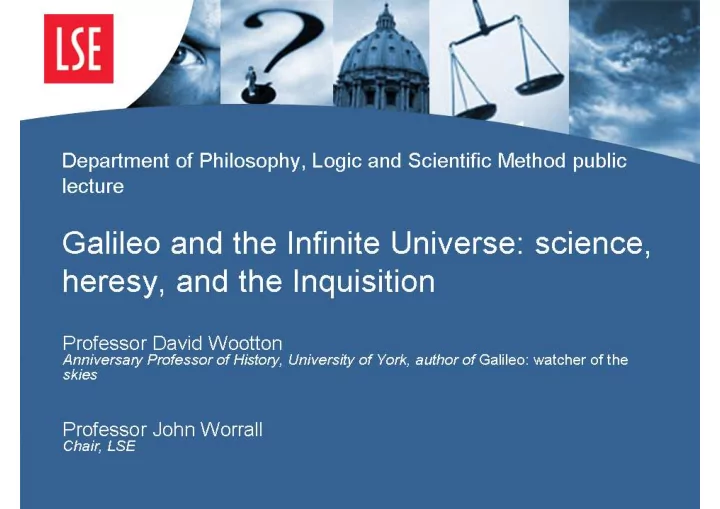

Galileo and the Infinite Department of Philosophy, Logic and Scientific Method public lecture Universe: science, heresy, and the Inquisition Professor David Wootton Anniversary Professor of History, University of York, author of Galileo: watcher of the skies Professor John Worrall Chair, LSE
Galileo and the Infinite Universe Science, Heresy and the Inquisition
An anecdote...
Galileo, 1564-1642 • Phase One: the unpublished professor, 1589-1610 • Phase Two: the struggle for Copernicanism, 1610-1616 • Phase Three: the struggle renewed, 1624-1632 • Phase Four: prisoner of the Inquisition, 1633-1642 • Phase Five: rehabilitation, 1642-2000 • Vincenzo Viviani, 1622-1703, and the tainted archive
Living with the Inquisition • Wearing a mask • Taking precautions • Lost conversations • Venetian exceptionalism
The reality of unbelief • Pisa: • Girolamo Borro • Francesco Buonamici • Padua and Venice: • Paolo Sarpi • Cesare Cremonini • Ed Muir, The Culture Wars of the Late Renaissance
Galileo and the Inquisition • Date unknown: denounced by his mother • 1604, denounced by Silvestro Pagnoni • 1615-6, denounced by Lorini and Caccini • 1624, anonymous denunciation of the Assayer • 1632-3, the Dialogue tried and convicted • 1633, denounced by Melchior Inchofer • 1633, denunciation of Archbishop of Siena • 1641, Sozzi denounces the Piarist fathers
Galileo’s (Un)belief (I) • The Negative Evidence: • Galileo never mentions Christ • Galileo “never” goes to Church • Galileo has few religious books • Galileo has no religious pictures, crucifixes, rosaries, etc.
Galileo’s (Un)belief (II) • The positive evidence • The lost treatise on miracles • Lucretian atomism • The marginalia • The letter to Dini • The diary of de Monconys • Viviani’s geometrical Christianity
Galileo’s (Un)belief (III) • The decisive evidence • Castelli’s visits to Galileo, December 1638 (OG xvii 382- 3, 398, 406, xix 395-6) • Castelli’s letter of 7 June 1639
Galileo and the Infinite Universe (1) • Alexandre Koyré, From the Closed World to the Infinite Universe (1957) • Thomas Digges, A perfit description of the coelestiall orbes (1576)
Image courtesy of The Linda Hall Library for History of Science
Galileo and the Infinite Universe (II) • Giordano Bruno, On the infinite universe and worlds (1584) • Galileo never mentions Bruno, but knew his work, and is taken by others to hold his views
Galileo and the Infinite Universe (III) • Letter to Ingoli, 1624 • I am certain that a person born and raised in a huge forest among wild beasts and birds, and knowing nothing of the watery element, would never be able to frame in his imagination another world existing in nature differing from his, filled with animals which could travel without legs or fast-beating wings, and not upon its surface alone like beasts upon the earth, but everywhere within its depths; and not only moving, but stopping motionless wherever they pleased, a thing which birds in the air cannot do. And that men lived there too, and built palaces and cities, and traveled with such ease that without tiring themselves at all they could proceed to far countries with their families and households and whole cities. Now as I say, I am sure that such a man could not, even with the liveliest imagination, ever picture to himself fishes, the ocean, ships, fleets, and armadas.
Earthlings • It is a great folly for us Terrestrials to want to be arbiters of their sizes and regulators of their local dispositions, we being quite ignorant of all their affairs and interests.
Adam to Raphael ... something yet of doubt remaines, Which onely thy solution can resolve. When I behold this goodly Frame, this World [ 15 ] Of Heav'n and Earth consisting, and compute, Thir magnitudes, this Earth a spot, a graine, An Atom, with the Firmament compar'd And all her numberd Starrs, that seem to rowle Spaces incomprehensible (for such [ 20 ] Thir distance argues and thir swift return Diurnal) meerly to officiate light Round this opacous Earth, this punctual spot, One day and night; in all thir vast survey Useless besides, reasoning I oft admire, [ 25 ] How Nature wise and frugal could commit Such disproportions,
Raphael to Adam If Earth industrious of her self fetch Day Travelling East, and with her part averse From the Suns beam meet Night, her other part Still luminous by his ray. What if that light [ 140 ] Sent from her through the wide transpicuous aire, To the terrestrial Moon be as a Starr Enlightning her by Day, as she by Night This Earth? reciprocal, if Land be there, Fields and Inhabitants: Her spots thou seest [ 145 ] As Clouds, and Clouds may rain, and Rain produce Fruits in her soft'nd Soile, for some to eate Allotted there; and other Suns perhaps With thir attendant Moons thou wilt descrie Communicating Male and Femal Light, [ 150 ] Which two great Sexes animate the World, Stor'd in each Orb perhaps with some that live. For such vast room in Nature unpossest By living Soule, desert and desolate, Onely to shine, yet scarce to contribute [ 155 ] Each Orb a glimps of Light, conveyd so farr Down to this habitable, which returnes Light back to them, is obvious to dispute.
Music playing at this point during the presentation, which can be heard in the podcast is Michaelangelo Galilei, ‘Sonate in A minor. Toccatta Corrente Corrente Volta’ by Paul Beier
Department of Philosophy, Logic and Scientific Method public lecture Galileo and the Infinite Universe: science, heresy, and Professor David Wootton the Inquisition Anniversary Professor of History, University of York, author of Galileo: watcher of the skies Professor John Worrall Chair, LSE
Recommend
More recommend